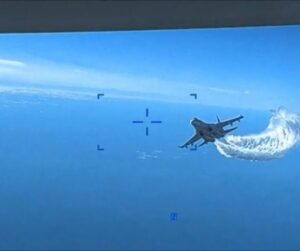Government officials and congressional leaders are expressing outrage at Russian jet fighters destroying a $30M US MQ-9 Reaper drone. The Reaper was over the Black Sea in international waters when a flight of two Soviet-era SU-27 Flanker fighters made multiple passes on the American unmanned drone. The US has been flying unmanned aerial vehicles (UAVs) over the Black Sea since the start of the Russian invasion of Ukraine. At first, Moscow’s messaging claimed the Reaper drone made a “sharp maneuver” that caused the collision.
Fortunately, the Reaper’s video system tells a different story. The Russian fighter pilots, thinking they could blind the Reaper’s sensors and cameras by dousing it with fuel, made attack runs to jettison fuel in front of the drone. These antics went on for 30 to 40 minutes, according to reports from the US European Command and the Pentagon. On one approach, the Russian pilot injecting fuel pulls up in front of the Reaper, but not fast enough, and strikes the drone.
Video Proves Russia Explanation Wrong
As the video footage clearly shows, when the Flanker pilot tries to avoid hitting the drone, he turns the underside of his fighter to the Reaper, and now he can’t see how close he is to the US aircraft. He impacted the rear of the Reaper and damaged the propeller on the rear-facing turboprop engine. Images show the bent tip of the prop. That kind of damage would cause the propeller shaft to vibrate catastrophically. The Reaper controllers had to ditch the aircraft. The Russian pilots’ maneuvers were senseless since, as the video clearly portrays, the jettisoned fuel immediately vaporized and dissipated. Combine poor airmanship with a silly, ill-conceived aerial maneuver, and a mid-air collision is certainly a possibility.

(Photo by United States European Command/Anadolu Agency via Getty Images)
Additionally, US government officials suggest the decision to intercept and attack the armed drone was intentional and came from very high levels in the Kremlin’s command staff. No one suggested Putin ordered it, but operations like this are not approved at the squadron level. The Russian military hierarchy is very structured and rigid. Lower-level leaders have minimal latitude in developing operational mission profiles.
The incident has sparked intense blowback from US legislators and government officials. “The Biden administration and lawmakers have blasted Russia for what they called an unprofessional and unsafe maneuver in which two Russian jets damaged a US MQ-9, forcing it to crash land in the Black Sea Tuesday,” The Hill reports. At the recent G-20 economic summit in New Delhi, India, US Secretary of State Antony Blinken encountered Russian Foreign Minister Sergei Lavrov. “During a security conference in New Delhi with top Indo-Pacific allies India, Australia, and Japan – a partnership dubbed the Quad – Blinken warned that standing up to Russia was more important than ever if international allies want to maintain peace in other regions of the world,” Fox News reported.
Russia Blames US for “Double Standard”
Lavrov countered with a string of non-sequiturs. As a Fox News article observed, “Lavrov … accused the US of employing ‘double standards’ by contesting Russia’s actions in Ukraine and … operations the US has carried out in places like Iraq, Libya, and Yugoslavia.” The Russian Foreign Ministers’ comments are typical Kremlin-speak – attack the opponent with examples that are irrelevant to the issue.
 The US and NATO can expect what happened over the Black Sea to be repeated. Russian Defense Minister Sergei Shoigu’s description of his telephone call with US Secretary of Defense Lloyd Austin on the incident made the Russian narrative clear. He said the US had ignored flight restrictions the Kremlin had imposed in the area and blamed the US for “the intensification of intelligence activities against the interests of the Russian Federation.” The defense minister warned the US that Russia “will respond in kind to all provocations.”
The US and NATO can expect what happened over the Black Sea to be repeated. Russian Defense Minister Sergei Shoigu’s description of his telephone call with US Secretary of Defense Lloyd Austin on the incident made the Russian narrative clear. He said the US had ignored flight restrictions the Kremlin had imposed in the area and blamed the US for “the intensification of intelligence activities against the interests of the Russian Federation.” The defense minister warned the US that Russia “will respond in kind to all provocations.”
The losses the Russian forces are experiencing and the failure to subdue Ukraine are wearing on Moscow’s leadership. The incident with the US drone in the Black Sea seems more like an act of desperation. Nonetheless, the reaction from Washington, DC, and NATO commanders appear resolute. The US will not be cowed by Russia and will continue to fly in international waters.
The views expressed are those of the author and not of any other affiliation.
Do you have an opinion about this article? We’d love to hear it! If you send your comments to [email protected], we might even publish your edited remarks in our new feature, LN Readers Speak Out. Remember to include the title of the article along with your name, city, and state.
Please respect our republishing guidelines. Republication permission does not equal site endorsement. Click here.

